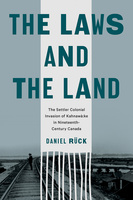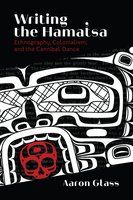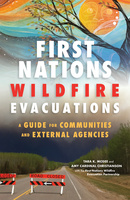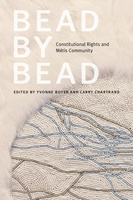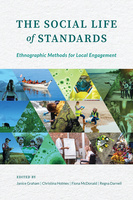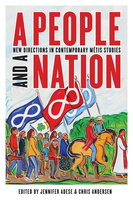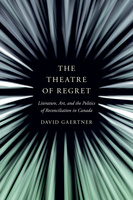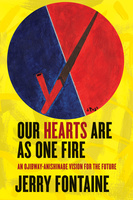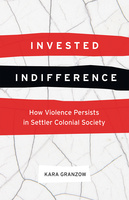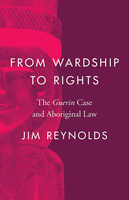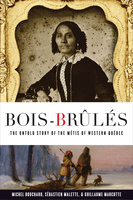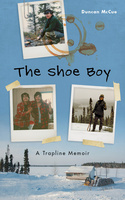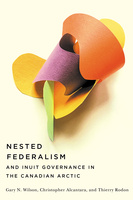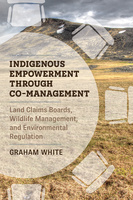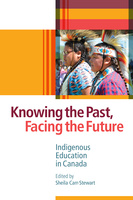The Laws and the Land
The Settler Colonial Invasion of Kahnawà:ke in Nineteenth-Century Canada
The Laws and the Land, an original and impassioned account of the history of the relationship between Canada and Kahnawà:ke, reveals the clash of settler and Indigenous legal traditions and the imposition of settler colonial law on Indigenous peoples and land.
Writing the Hamat'sa
Ethnography, Colonialism, and the Cannibal Dance
Writing the Hamat̓sa critically surveys more than two centuries worth of published, archival, and oral sources to trace the attempted prohibition, intercultural mediation, and ultimate survival of one of Canada’s most iconic Indigenous ceremonies.
First Nations Wildfire Evacuations
A Guide for Communities and External Agencies
Based on the experiences of evacuees from seven First Nations communities, this book offers guidance to Indigenous communities and external agencies on how to successfully plan for and carry out wildfire evacuations.
Bead by Bead
Constitutional Rights and Métis Community
Bead by Bead lays bare the failure of judicial doctrine and government policy to address Métis rights, and offers constructive insights on ways to advance reconciliation.
The Social Life of Standards
Ethnographic Methods for Local Engagement
The Social Life of Standards reveals how political and technical tools for organizing society are developed, applied, subverted, contested, and reassembled as local communities interact with standards created by external forces.
A People and a Nation
New Directions in Contemporary Métis Studies
In A People and a Nation, the authors, most of whom are themselves Metis, offer readers a set of lenses through which to consider the complexity of historical and contemporary Métis nationhood and peoplehood.
The Theatre of Regret
Literature, Art, and the Politics of Reconciliation in Canada
The Theatre of Regret reveals the role that Indigenous and allied literatures play in challenging state-centred discourses of reconciliation in Canada.
Our Hearts Are as One Fire
An Ojibway-Anishinabe Vision for the Future
Reframing Manitou Aki (Creator's Land) history from the perspective of the Ojibway-Anishinabe, Our Hearts Are as One Fire shares a vision for the leaders of today and tomorrow.
Invested Indifference
How Violence Persists in Settler Colonial Society
Invested Indifference exposes the tenacity of violence against Indigenous people, arguing that some lives are made to matter – or not – depending on their relation to the settler-colonial nation state.
From Wardship to Rights
The Guerin Case and Aboriginal Law
This thoughtful and engaging examination of the Guerin case shows how it changed the relationship between governments and Indigenous peoples from one of wardship to one based on legal rights.
Bois-Brûlés
The Untold Story of the Métis of Western Québec
Bois-Brûlés shatters the prevailing orthodoxy that Métis communities are found solely in western Canada by demonstrating that a distinct community emerged in the fur trade frontier of Quebec in the early nineteenth century and persists to this day.
The Shoe Boy
A Trapline Memoir
The Shoe Boy is an evocative exploration of Indigenous identity and connection to the land, expressed in guise of a unique coming-of-age memoir set on a trapline in northern Quebec.
Nested Federalism and Inuit Governance in the Canadian Arctic
Nested Federalism and Inuit Governance in the Canadian Arctic explores how three northern regions are reformulating the relationship between Indigenous peoples and the state, and transforming Canadian federalism in the process.
Indigenous Empowerment through Co-management
Land Claims Boards, Wildlife Management, and Environmental Regulation
This book is a clear, compelling, and evidence-based assessment of the effectiveness of co-management boards in providing Indigenous peoples with genuine influence over land and wildlife decisions affecting their traditional territories.
Knowing the Past, Facing the Future
Indigenous Education in Canada
Knowing the Past, Facing the Future offers a sweeping account of Indigenous education in Canada, from the first treaty promises and the failure of government-run schools to illuminating discussions of what needs to change now to work toward reconciliation.

